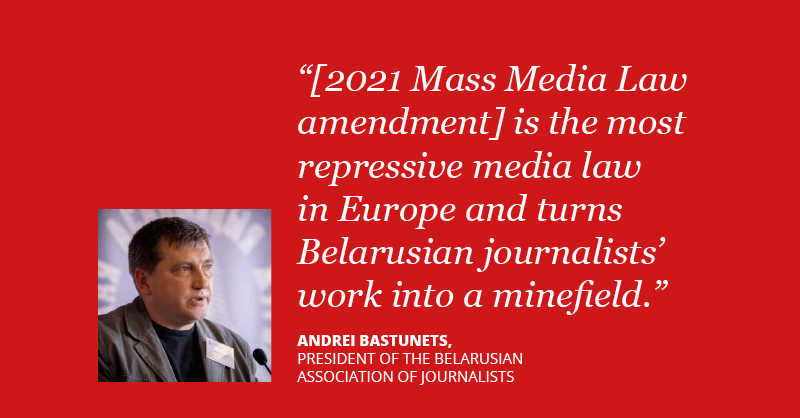Download our PDF factsheet.
Belarusian authorities attack on remaining domestic independent media
The Belarusian authorities are taking deliberate actions to eliminate independent media and the ability of Belarusian citizens to access factual information.

Belarus is already the most dangerous country in Europe for journalists.In 2020, authorities detained 480 journalists who spent, collectively, more than 1,200 days behind bars. As of 1 June 2021, 33 media employees are currently being detained. Ranking 158 in 2021, Belarus is the most dangerous country in Europe for media personnel according to the RSF Press Freedom Index. |
|
Authorities are restricting the ability of citizens to access information.On 18 May, authorities searched the editorial office, local offices, and homes of journalists and editors of internet portal TUT.BY, as well as the editorial offices of TUT.BY’s sub-divisions, AV.BY and RABOTA.BY. Almost simultaneously, the authorities blocked access to tut.by website and opened a criminal case against officials of TUT.BY MEDIA LLC. |
|
Authorities are actively targeting independent Belarusian media and journalists outside of Belarus.On 23 May, Ryanair flight 4978 from Athens to Vilnius was forced to divert to Minsk National Airport in what the international community has condemned as “state-sponsored hijacking”. In what is widely considered the reason for the forced diversion, Belarusian authorities subsequently detained a passenger, journalist and political activist Raman Pratasevich. |
|
Authorities are using legislative means to shut down the final remaining independent media in Belarus.On 24 May, amendments to three important pieces of legislation were signed into law further attacking Freedom of Expression and Freedom of Assembly; namely, amendments to the Law on Mass Event, Law on Mass Media, and Law on Telecommunications. |
Belarusian authorities use legislative means to further attack and shutdown independent media
Legislation approved on 24 May 2021 places Belarus in further violation of international human rights law and Freedom of Expression standards.
Amendment to 1997 Law on Mass Events
Largely bans any form of public protest against the authorities, and threatens individuals who might participate and journalists or media outlets which cover such events.
- Prohibits live coverage in the media of mass events, including online streaming if such events are organised in violation of the law.
- Places restrictions on journalists which could mirror those of mass events participants; thus allowing for the potential arbitrary arrest of journalists.
- Prohibits the collection of funds to pay fines or other expenses for those found guilty of violating the law, including journalists.
Amendment to 2008 Law on Mass Media
Establishes additional severe restrictions on independent media and allows authorities to close them without court hearings.
- Places further limits on individuals or legal entities who can start and operate media outlets.
- Expands list of grounds upon which authorities can refuse registration of media outlets.
- Allows authorities to suspend a media outlet following 2 written warnings in 12 months.
- Allows authorities, in addition to the court, to suspend a media outlet without warning if it is deemed to be a national security threat.
- Restricts online media outlets in cases where those outlets are publishing materials considered propaganda, harmful to national security, or extremist.
- Curbs the rights of journalists by expanding how and when accreditation can be revoked.
- Bans the publishing of public opinion polls, hyperlinks to them, on socio-political issues without proper accreditation.
Amendment to 2005 Law on Telecommunications
Restricts access to, and ability to share, information.
- Establishes power of the Operations and Analysis Centre (OAC), formerly a subdivision of the State Security Committee (KGB), now under the Presidential Administration, to restrict and/or suspend the functioning of telecommunications networks.
- Gives OAC power to limit or block internet access for any reason they see fit.
This analysis of the situation for independent media in Belarus as of June 2021 was prepared by Human Rights House Foundation in partnership with Article 19, International Media Support, Index on Censorship, and Reporters Without Borders.





